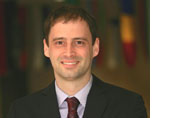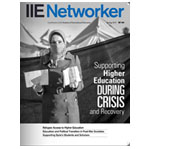
| IIE Home | Membership | Publications | Open Doors | Contact Us | Subscribe |
|
||
|
News

Proposals Due: April 27, 2015 | Download Request for Proposals | Contact
The Institute of International Education, on behalf of the U.S. Department of State’s Bureau of Educational and Cultural Affairs’ EducationUSA Advising Network, invites accredited U.S. post-secondary educational institutions (non-profit and for-profit), U.S. higher education associations, university systems, consortia, and qualified entities that meet provisions in IRS section 26 USC 501(c)(3) to submit proposals to be a Partner Organization for the second round of EducationUSA Leadership Institutes. Partner Organizations will develop and manage one or more EducationUSA Leadership Institute(s) for approximately15 mid- to upper-level foreign college or university administrators, Ministry of Education or other government officials, or other qualified participants from select countries and world regions. The Institutes consist of intensive, short-term academic programs that provide participants with the opportunity to deepen their understanding of U.S. higher education, develop the tools necessary to build capacity within their own systems, and engage with the U.S. higher education sector in effective, sustained ways.
Applicants are invited to submit proposals to host one or more of the following Institutes (each proposed Institute must address only one of the following three topics):
Applicants are invited to submit proposals focusing on one or more of the above-mentioned topics.
On October 1-2, 2015, the inaugural IIE Summit will bring together Generation Study Abroad commitment partners in Washington, DC, to highlight their progress and create positive new solutions.
A sneak peak at session topics include:
Book your room now at the conference hotel for special negotiated rate. Hotel accommodation can be booked online through the conference registration site.
 IIE Publication Manager Jon Grosh details four ways that your academic institutions can help support students and scholars affected by crisis and conflict. The key areas—advocacy, research, hosting, and local engagement—are collected from lessons and recommendations included throughout the latest edition of the IIENetworker magazine "Supporting Higher Education During and After Crisis," now available as a free electronic flipbook. IIE Publication Manager Jon Grosh details four ways that your academic institutions can help support students and scholars affected by crisis and conflict. The key areas—advocacy, research, hosting, and local engagement—are collected from lessons and recommendations included throughout the latest edition of the IIENetworker magazine "Supporting Higher Education During and After Crisis," now available as a free electronic flipbook.UNESCO has released Key findings of the 2015 EFA Global Monitoring Report (GMR) "Education for All 2000-2015: Achievements and Challenges," which has tracked progress on these goals for the past 15 years. Only half of all countries have achieved the most watched goal of universal primary enrolment. According to UNESCO, "An extra $22 billion a year is needed on top of already ambitious government contributions in order to ensure we achieve the new education targets now being set for the year 2030."
Mexico and U.S. Join in Educating Students ‘To Compete With the World’ This article takes an in-depth look at how the United States and Mexico are working together to share educational resources to train and develop the future workforce of Mexico. — The Dallas Morning News Weigh the Pros, Cons of Earning a Bachelor's Degree in Europe This article sheds light on some challenges of pursuing full degrees abroad, including language and potential transferability issues, as well as many clear benefits, including saving money. — U.S. News and World Report Community Colleges Commit to More Overseas Students International students bring diversity and revenue to campuses, yet while foreign-student enrolment is up 40 percent at 4-year colleges and universities over the past decade, community colleges are just beginning to catch up. — Chicago Tribune Seven Actionable Strategies to Advance Women IWISE Working Group published a paper in Cell Stem Cell that recommends seven actionable strategies for advancing women scientists, engineers, and doctors, and enabling them to excel and truly thrive in their fields. — NYSCF.org Stacie Berdan argues in this opinion piece that simply signing up and going abroad isn't enough; colleges and study abroad offices must do more to integrate study abroad into a broader global-education curriculum in order maximize benefits for students. — Chronicle of Higher Education
Articles published from March 30–April 13 highlight the impact of returned international students in their home countries, international students attending U.S. community colleges, and Syrian students supported by IIE's Emergency Student Fund. Our bi-weekly news roundup provides quick links to a selection of recent news stories. Deadlines
Submission Deadline: April 18, 2015 | Take 5-Minute Survey
The Institute of International Education (IIE) is working on a new book for international students considering studying in the United States. One of the objectives of the book is to help prospective students better understand the higher education system and various aspects of U.S. college life by identifying and defining common—and often misunderstood—American terms. The survey should take no more than 5 minutes of your time. If you’d like your institution to be mentioned as a contributor in the book, please make sure you include your contact information in the space provided in Question 6.
The Fulbright-Hays Doctoral Dissertation Research Abroad (DDRA) Fellowship Program provides grants to colleges and universities to fund individual doctoral students who conduct research in other countries, in modern foreign languages and area studies for periods of six to 12 months. Projects deepen research knowledge on and help the nation develop capability in areas of the world not generally included in U.S. curricula. Projects focusing on Western Europe are not supported.
Scholar Rescue Fund
The Institute of International Education's Scholar Rescue Fund (IIE-SRF) announces its next round of applications from scholars facing threats to their lives or academic work. Fellowships support temporary academic positions at colleges, universities, and other research institutions outside the scholars' home countries anywhere in the world. Professors, researchers, and public intellectuals from any country, field, or discipline may apply.
 Monica Ibrahim’s article in the newly released IIENetworker magazine makes concise recommendations on how to better support Syrian students based on their current needs. "While many notable efforts exist to support Syrian students, the need continues to grow," writes Ibrahim. "Without education and other alternatives, many Syrian youth may be drawn towards violence and other undesirable outcomes." Monica Ibrahim’s article in the newly released IIENetworker magazine makes concise recommendations on how to better support Syrian students based on their current needs. "While many notable efforts exist to support Syrian students, the need continues to grow," writes Ibrahim. "Without education and other alternatives, many Syrian youth may be drawn towards violence and other undesirable outcomes." |
| www.iie.org/iienetwork • Member website of the Institute of International Education © 2025 Institute of International Education. All rights reserved. |



